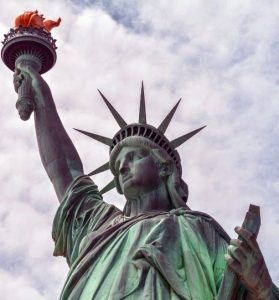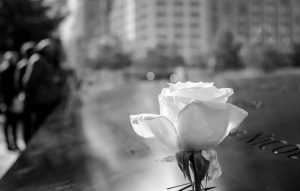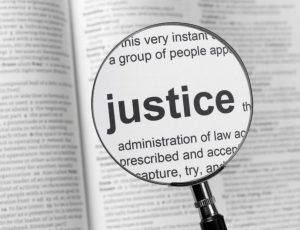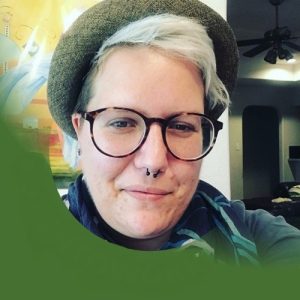Home » class bias
Category Archives: class bias
Meet Eli Poore
Eli Poore is one of the newest UU Class Conversations’ Steering Committee members. They bring a grounded perspective in the ways we can better serve those with less class advantage and new ways to bridge class divides.
I’m currently serving as an intern minister for the Southern Oregon UU Partnership, which includes congregations in Ashland, Grants Pass and Klamath Falls, Oregon.
For the past eight years, I’ve been involved in an ongoing street ministry/community development project with communities experiencing poverty and houselessness through a nonprofit organization that I co-founded with a friend and mentor to support our work, Coastal Bend Community Empowerment. The work with the unhoused community has been particularly successful. It began with the “Unsheltered Voices Listening Project,” funded in part by the UU Funding Program, and involved utilizing a relationship-based community organizing framework centered on the gifts and goals of the community to mobilize and make change. We were able to unify and mobilize community members and through a listening process identified goals that were important to this community.
This project has grown into a wider initiative to end houselessness citywide, and now involves interfaith groups, housed partners, service providers, and is supported by city and county leaders. But the voices of the houseless neighbors remain at the center. They have come together to partner on neighborhood beautification initiatives and monthly beach cleanups in partnership with other groups. Additionally, they have held fundraisers that provide direct support to unhoused community members for things like obtaining IDs, temporary housing, busfare, etc.
Building Equitable Relationships
I completed a community ministry internship that sought to build relationships between housed and unhoused neighbors, moving into more relational frameworks and out of one-sided charity frameworks, which perpetuate power imbalances. I also served as a founding board member, and Director of Community Development, overseeing a small paid staff and volunteers in our wider community development and training iniatives, which included poverty simulations and “power shift” and “mission shift” trainings for churches and nonprofits.
I have experience in organizational development, strategic planning, fundraising and marketing in both the nonprofit and for-profit sectors. I am also involved in the trans UU professional group “TrUUst.” During my involvement on the TrUUst board, we have secured and increased our funding from the UUA twofold, as well as developed a wider fundraising plan involving support from members and congregations.
During seminary, I had my own marketing and web design business, specializing in web development, marketing and social media management for nonprofits and small businesses.
I’m also involved in the national leadership team of Faith in Harm Reduction, which promotes harm reduction initiatives grounded in a faith-based perspective. Harm reduction practices include safer use supplies, but also things like housing first and centering the voices and perspectives of people experiencing structural violence in an intersectional way. My doctoral program is focused on building a theological framework for harm reduction practices, and I aim to create a UU Harm Reduction Coalition in time.
“I have a love for developing and growing organizations and organizational systems, and I think that class issues should be discussed more robustly in our denomination.”
Class Issues in the Real World
Class issues are important to me for a number of reasons. I come from a working class background and have been directly impacted by classism, poverty and my experience of houselessness. I’ve confronted classism directly not only in UU congregations but in the wider world.
I also experienced class issues in the context of carceral systems, being formerly incarcerated too, seeing how race, class and other identities come together in the likelihood of an individual’s contact with carceral systems as well as the outcomes of that contact, which perpetuate intersectional disparities and has for decades now devastated whole communities. I’ve seen how my privilege as a white person has manifested in all of these experiences, providing a boon for me in some aspects, as well as the way classism has presented through systemic, interpersonal, and personal disadvantages and biases.
Why do I look forward to serving on the UU Class Conversations Steering Committee? I have a love for developing and growing organizations and organizational systems, and I think that class issues should be discussed more robustly in our denomination. This is particularly important given the general demographics of most UU congregations and organizations which skew white, educated, and middle to upper middle class. This can leave out many who have much to give to our movement.
Eli Poore, M.Div MA NCPRSS
D.Min Student, Harm Reduction and Faith Communities, Street and Urban Ministries
(Pacific School of Religion/Graduate Theological Union)
Leadership Committee, TrUUst (www.transuu.org)
National Leadership Team, Faith in Harm Reduction (www.faithinharmreduction.org)
(they/them;xe/xem)
Voting Is Radical
 If you have not already voted – you are undecided, disillusioned, resentful or just plain tired of it all – realize that people like you who care about class justice must vote. It is an act of resistance. Why?
If you have not already voted – you are undecided, disillusioned, resentful or just plain tired of it all – realize that people like you who care about class justice must vote. It is an act of resistance. Why?
When the U.S. Constitution was adopted on June 21, 1788, voting was left to the states. With rare exception, only white Anglo-Saxon Protestant males, who own property and were older than 21 were allowed to vote.* So, only those with extreme class advantage were given this right, one that many of us have taken for granted for decades now.
But most of us also know that the right to vote was doled out to those of us with limited class advantage slowly and painfully. Black men were “allowed” to vote in 1870 but racist AND classist obstacles like poll taxes and literacy tests (even in states like Connecticut) kept most from doing so for generations. Of course, henchmen for the owning classes meted out violence on Black men with some class advantage who tried to vote.
It took until 1920 for women to “earn” the opportunity to vote, but Black women in many southern states were not able to vote until many years later. According to History.com:
“Native Americans—both men and women—did not gain the right to vote until the Snyder Act of 1924, four years after the ratification of the 19th Amendment and more than 50 years after the passage of the 15th Amendment. Even then, some Western states, including Arizona, New Mexico and Utah, didn’t grant Native Americans the right to vote until the 1940s and ‘50s. It wasn’t until the Cable Act of 1922 that women were allowed to keep their citizenship – and gain the right to vote – if they were married to an immigrant (who had to be eligible to become a U.S. citizen).
In Puerto Rico, literate women won the right to vote in 1929, but it wasn’t until 1935 that all women were given that right. Realize that literacy tests were extremely difficult to pass.**
And Asian American immigrant women were denied the right to vote until 1952 when the Immigration and Nationality Act allowed them to become citizens.”
If this does not convince you that voting is radical, you know that there are those with great class privilege in the United States who are using every advantage they have right now, money, access to media and social media, connections and more, to keep the rest of us from voting. According to the Brennan Center, states have added almost 100 laws restricting voting since the Voting Rights Act was rendered nearly toothless a decade ago.
I know you share UU Class Conversations’ passion for class justice and an end to classism. So, voting is something you must do, right? Happy voting. And thank you for ensuring that this right continues with people who care about it as much as you do
* A few states allowed free Black men to vote, and New Jersey also included unmarried and widowed women who owned property.
** https://www.history.com/news/19th-amendment-voter-suppression
Remembering 9/11: Forgetting None
 As we remember the terrible devastation, sorrow and inhumanity those many years ago on 9/11, let’s also remember how people and institutions came together around the world to support one another on that day and since. Let’s remember also how our own Unitarian Universalist organizations, the UU Service Committee and UU Association, together raised funds from members/congregants across the country to support the families and loved ones of 9/11 victims who would not receive support from “traditional” charities.
As we remember the terrible devastation, sorrow and inhumanity those many years ago on 9/11, let’s also remember how people and institutions came together around the world to support one another on that day and since. Let’s remember also how our own Unitarian Universalist organizations, the UU Service Committee and UU Association, together raised funds from members/congregants across the country to support the families and loved ones of 9/11 victims who would not receive support from “traditional” charities.
Undocumented workers’ families were ineligible for support from the government and many charities – even when the victims were the sole support of the family. Because of their status, undocumented workers had toiled in the shadows of the Twin Towers in obscurity, and families had no proof that the worker had held a job. Additionally, the families lacked the class advantage that could open doors to their new country’s legal system.
In 2001, legal marriage was not yet available for lgbtq+ individuals. Without a marriage license, the partners of 9/11 victims and their children were often ineligible for support from most organizations. The UU Service Committee worked with immigrant rights and lgbtq+ groups on the ground in New York City, Washington, D.C. and Pennsylvania to make sure that classism and other forms of bias could not keep families from receiving the help and support they needed.
Additionally, UUSC continued to support those affected by the tragedy. For example, it funded clinics addressing the rise in respiratory illnesses in communities of color that were in the direct path of the massive dust clouds that filled the air following the towers’ collapse. And, of course, individual UU congregations and groups were on the front lines to support 9/11 survivors and families in the immediate aftermath and beyond.
So, as we remember the events of 9/11, let us remember also to continue the fight against classism and bias. And, as UUs, let us continue to press for lgbtq+, BIPOC and immigrant rights – all under attack from organized internal forces. Remember everyone!
It’s Hard Right Now, but Keep Moving Forward
 Denise Moorehead, UU Class Conversations
Denise Moorehead, UU Class Conversations
I sat in a staff meeting on Wednesday morning, May 25, 2022, listening to my colleagues share their reactions to a gunman’s rampage that killed 19 children and two teachers in Uvalde, Texas, the day before. We are administrators for private schools serving students from 2 to 20 years old. The head of our team said his first response was to scream, “NO MORE.” Another — the most buttoned-down one among us — said she was so #!!*ing tired of the carnage followed by nothing from those at the highest levels elected to make change.
When we talked about the steps we’d taken/needed to take to support our students and parents, the remarks by one school director broke my heart. She said with a deep sigh, “We sent an email to parents last night. We updated a message that was first written to families 10 years ago after the Newtown, Conn., massacre.” She added that she had updated that letter countless times for the many mass shootings since Newtown as well as for state-instituted killings like that of George Floyd.
In the past decade, our schools have made a substantial investment in improving security and in preparing students and staff to react quickly in cases of a dangerous intruder. So, why are we stuck in the same place 10 years after Newtown? As one politically-active colleague said of her own social justice efforts, “Why even bother anymore?”
Why? Because we must.
But It’s Hard
I have been involved in social justice work since I was a child. My mom took me to community-building activities while I was still in grade school. These are hard times for people who believe in social justice, equity, and addressing classism and racism.
The expected overturning of Roe v. Wade will most severely impact women and families with less class advantage. According to a May 2022 NPR report on the landmark Turnaway Study, women denied an abortion were four times more likely to be living in poverty years later than those who had one. Their children were less likely to attain higher education were more likely to be involved in crime and had lower adult earnings.
According to a recent study by Columbia University researchers, more than 3.7 million children in the U.S. slipped into poverty when conservative members of Congress refused to extend the expanded Child Tax Credit beyond December 2021. States across the nation have outlawed telling the truth about racism and the racial wealth gap, allowing transgender children to become themselves or even providing water to people waiting in line to vote (in under-resourced primarily black and brown areas). The proliferation of new voter suppression laws is meant to keep people of color and those with less class advantage from participating in American democracy. And this is the tip of the iceberg when we look at the backpedaling of policies that have advanced social justice, equity and equality.
The effects of these policy reversals have not and will not directly touch the lives of people in the sphere of our elected officials. Over half of the members of Congress are well-educated millionaires from safe neighborhoods with “good schools.” According to FundHero December 2020 research, even in local elections the average cost for each vote received is $1.00. I don’t know about you, but I don’t have $5,000 to be elected to the local Library Board.
It’s no surprise then, that most federal and local policies support those with more class advantage. This is true of gun laws also. According to Mark S. Kaplan, professor of Social Welfare at UCLA, there is a strong relationship between poverty, inequality and firearm violence*.
It’s Up to Us
It is hard to keep up the fight for justice right now, whether it is for social class, race, gender, LQBTQ+, disability rights and/or other forms of equity. But oppression can only fester and grow when people give up hope for a future that holds promise for each person. We can pause for a few moments to feel sad, overwhelmed and discouraged. We are human. But then we have to take a breath, regroup and keep pushing forward.
Here are just some of the lesser-known social justice pioneers I appreciate:
- Frances Perkins, the first woman to serve as a member of a U.S. president’s Cabinet and a champion of those with less class advantage.
- South African students who mobilized and led the 2015-17 #RhodesMustFall and #FeesMustFall movements that fundamentally changed the landscape of higher education in South Africa.
- U.S. racial justice heroes like John Lewis, A. Philip Randolph, Bayard Rustin, Ella Baker, Callie House and Fred Korematsu, Lupe Anguiano and Chrystos (Menominee)
- Frank Bowe who worked to help people with disabilities
- Modern-day and historical women’s rights activists like Panusaya Sithijirawattanakul and Emmeline Pankhurst
- Environmentalists like Nnimmo Bassey
Who are the modern-day and historical (s)heroes who inspire you to stay the course when you feel like giving up? Share yours in the comments below.


